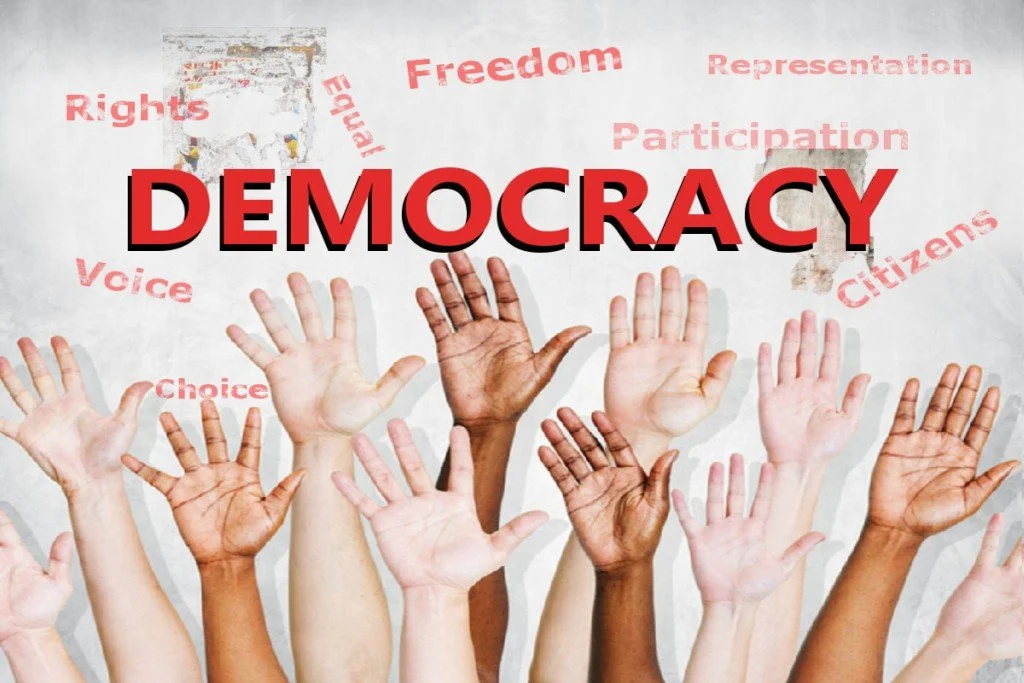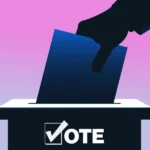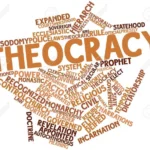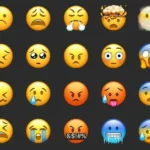
Democracy is a cornerstone of modern governance, embodying the principles of representation, participation, and accountability. This overview presents a selection of key facts that illustrate the various dimensions of democratic systems around the world. From the challenges of youth voter engagement to the largest electoral exercise in history, each point underscores the importance of active participation in shaping a nation’s political landscape. By examining these aspects of democracy, we can better understand its significance and the ongoing efforts to uphold democratic values globally.
Athenian Democracy: The roots of democracy can be traced back to ancient Athens around 508-507 BC, where a system of direct democracy was established. This form of governance allowed free male citizens of Athens, approximately 30,000 out of a population of about 300,000, to participate directly in decision-making through assemblies and councils. Citizens could speak and vote on laws and policies, making Athens a pioneering model of participatory government. However, it is important to note that this democracy excluded women, slaves, and foreigners, highlighting the limitations of the Athenian system.
Universal Suffrage: The ratification of the 19th Amendment to the U.S. Constitution on August 18, 1920, marked a significant milestone in the fight for women’s rights in the United States. This amendment granted women the legal right to vote, following decades of activism and struggle by suffragists who campaigned for gender equality. The first nationwide election in which women could vote was held in November 1920, resulting in approximately 8 million women voting, which represented a transformative moment in American democracy and set a precedent for women’s suffrage movements worldwide.
Largest Democracy: India is recognized as the largest democracy in the world, with over 1.4 billion people, making it the most populous country to practice democratic governance. The Indian general elections are a monumental event, with more than 900 million eligible voters participating in the 2019 elections. This process involves a complex and extensive electoral framework, including over a million polling stations across the country. The elections are held every five years, and the scale of this democratic exercise is unparalleled, showcasing India’s commitment to democratic principles despite its diverse and multi-ethnic society.
First Modern Democracy: The United States is often hailed as the first modern democracy, with its Constitution, adopted in 1787, establishing a framework for governance based on democratic principles. The Constitution outlined the separation of powers among the executive, legislative, and judicial branches, ensuring checks and balances. The subsequent ratification of the Bill of Rights in 1791 added essential protections for individual liberties. This foundational document has served as a model for democratic governance worldwide and has been amended 27 times to adapt to changing societal needs, reflecting the dynamic nature of democracy.
Voting Age: In most countries, the legal voting age is set at 18 years, allowing young adults to participate in the democratic process. However, there are exceptions; for instance, Austria allows citizens as young as 16 to vote in all elections, reflecting a more inclusive approach to youth participation in democracy. This variation in voting age highlights differing cultural attitudes towards youth engagement and the belief that younger individuals can contribute meaningfully to political discourse and decision-making.
Most Expensive Election: The 2020 U.S. presidential election is recorded as the most expensive election in U.S. history, with expenditures totaling approximately $14 billion. This staggering amount reflects the increasing costs associated with campaigning, including advertising, staffing, and outreach efforts. The election saw a significant rise in fundraising through both traditional and digital platforms, with candidates leveraging social media and online donations to mobilize support. The immense financial stakes involved have sparked debates about the influence of money in politics and the implications for democratic processes.
Longest-Serving Elected Leader: Fidel Castro, who led Cuba from 1959 until his retirement in 2008, holds the record for the longest-serving elected leader in history, with a tenure of 49 years. Castro’s leadership was marked by significant political and social changes in Cuba, including the establishment of a one-party socialist state. His prolonged rule was characterized by both staunch support and fierce opposition, reflecting the complexities of governance in a politically polarized environment. His legacy continues to influence discussions on leadership, democracy, and governance in Cuba and beyond.
Shortest Term: William Henry Harrison, the ninth president of the United States, holds the record for the shortest presidential term, serving only 31 days from March 4 to April 4, 1841. Harrison delivered an extensive inaugural address in inclement weather without appropriate clothing, which is believed to have contributed to his illness and subsequent death from pneumonia. His brief presidency highlights the unpredictability of political life and the importance of health and preparedness in leadership roles.
Voter Turnout: The highest voter turnout for a U.S. presidential election occurred in 1900, with 73.7% of eligible voters participating. This election was marked by a highly contested race between incumbent President William McKinley and Democratic challenger William Jennings Bryan. Factors contributing to high turnout included intense political engagement, significant issues of the time, and a growing awareness of the importance of voting. Voter turnout has fluctuated over the years, with recent elections experiencing varying levels of engagement, often influenced by factors such as voter mobilization efforts, contentious political climates, and societal issues.
First Country to Grant Women the Vote: New Zealand made history in 1893 by becoming the first self-governing country in the world to grant women the right to vote in parliamentary elections. This landmark decision followed years of activism by suffragists, who campaigned tirelessly for gender equality and women’s participation in the political process. The passage of the Electoral Act in 1893 allowed women to vote in the general elections, which took place later that year. This progressive move not only empowered women in New Zealand but also inspired suffrage movements globally, setting a precedent for other countries to follow in the pursuit of women’s rights and democratic participation.
These expanded details provide a deeper understanding of the significance and context behind each trivia point related to democracy.
Longest Constitution: The Constitution of India, adopted on January 26, 1950, is recognized as the longest written national constitution in the world, comprising over 450 articles and numerous amendments. It was drafted by a Constituent Assembly led by Dr. B.R. Ambedkar and reflects the diverse and pluralistic nature of Indian society. The Constitution encompasses a wide range of fundamental rights, duties, and directive principles aimed at ensuring justice, liberty, equality, and fraternity among all citizens. Its comprehensive nature addresses various aspects of governance, social justice, and individual rights, making it a significant document in the realm of democratic governance.
Direct Democracy: Switzerland is renowned for its system of direct democracy, which allows citizens to participate directly in political decision-making. Swiss citizens can propose changes to the constitution and laws through a process known as a referendum, requiring a certain number of signatures from registered voters to bring issues to a vote. This system fosters civic engagement and empowers citizens to have a direct say in legislative matters. Notably, Swiss voters have the right to challenge laws passed by parliament, reflecting a deep commitment to participatory governance and accountability in the democratic process.
Most Democratic Country: According to the Economist Intelligence Unit’s Democracy Index, Norway has consistently ranked as the most democratic country in the world. This index evaluates countries based on factors such as electoral process, civil liberties, political culture, and functioning of government. Norway’s strong commitment to democratic values, high levels of political participation, and robust protection of individual rights contribute to its top ranking. The country’s political system emphasizes transparency, accountability, and inclusiveness, making it a model for democratic governance globally.
First African Country to Gain Independence: Ghana made history on March 6, 1957, by becoming the first African country to gain independence from colonial rule. Led by Kwame Nkrumah, Ghana’s independence movement was a significant milestone in the decolonization of Africa and inspired numerous other countries to pursue self-governance. The end of British colonial rule marked the beginning of a new era for Ghana, emphasizing national identity and self-determination. Ghana’s independence is celebrated annually as Independence Day, symbolizing the broader struggle for freedom across the continent.
Majority Rule: The principle of majority rule is a cornerstone of democratic governance, requiring that decisions be made based on the preference of more than 50% of voters. This principle aims to ensure that the will of the majority is reflected in political outcomes while protecting the rights of minorities. Majority rule is often implemented in various voting systems, including simple majority, absolute majority, and qualified majority, depending on the context of the decision. While it is fundamental to democratic processes, it also raises discussions about balancing majority power with minority rights to maintain a fair and just society.
Electoral College: In the United States, the Electoral College is the body responsible for electing the president and vice president. Comprising 538 electors, the system allocates electors to each state based on its representation in Congress, with a candidate requiring 270 electoral votes to win the presidency. This indirect voting system was established in the U.S. Constitution and has been the subject of debate regarding its effectiveness and fairness. Critics argue that it can lead to scenarios where a candidate wins the presidency without winning the popular vote, highlighting the complexities and challenges of the electoral process in a democratic system.
Voting Systems: The United Kingdom employs a first-past-the-post electoral system, where the candidate with the most votes in a constituency wins, regardless of whether they achieve an absolute majority. This system is straightforward and quick in determining winners but can lead to disproportionate representation, where smaller parties may struggle to gain seats. In contrast, Germany utilizes a mixed-member proportional representation system, combining direct constituency votes with party lists to ensure a more proportional outcome in its parliament. This approach aims to reflect the diverse political preferences of the electorate more accurately, showcasing different methodologies in democratic voting systems.
Most Political Parties: As of 2021, Italy is noted for having one of the highest numbers of political parties in a parliamentary system, with over 30 parties represented in its parliament. This multitude of parties reflects Italy’s diverse political landscape and the complexity of its electoral system, which allows for coalition governments. While having numerous parties can enhance representation of varied interests, it can also lead to political instability and challenges in forming effective governance. The Italian political system illustrates the dynamics of coalition politics and the negotiation processes necessary to achieve consensus among different political factions.
Youth Participation: In the 2016 U.S. presidential election, approximately 50% of eligible voters aged 18-29 participated, a figure that reflects ongoing challenges in engaging younger voters in the electoral process. Factors influencing this low turnout include a lack of awareness about the voting process, feelings of disenfranchisement, and the perception that their votes do not matter. Various organizations have since focused on increasing youth engagement through initiatives such as voter registration drives, educational campaigns, and social media outreach, aiming to empower young people to exercise their right to vote and influence the political landscape.
Largest Electoral System: The Indian general election in 2019 stands as the largest electoral exercise in history, with over 900 million voters eligible to participate. This monumental event took place over several weeks and involved an extensive logistical operation to ensure that all eligible citizens could cast their votes. The election not only showcases India’s democratic framework but also highlights the challenges of conducting such a vast electoral process, including security, accessibility, and the management of diverse languages and cultures across the country. The scale of this election underscores the importance of democracy in India and the active role of its citizens in shaping governance.
First Constitution: The U.S. Constitution, adopted in 1787, holds the distinction of being the oldest written national constitution still in use today. This foundational document established the framework for the federal government and laid down the principles of democracy, including checks and balances among branches of government, the separation of powers, and the protection of individual rights through the Bill of Rights. The Constitution has been amended 27 times to address changing societal needs and values, reflecting the dynamic nature of governance and the ongoing dialogue about civil liberties and the role of government in American life.
Recall Elections: California is particularly notable for its use of recall elections, a political mechanism that allows voters to remove elected officials from office before the end of their term. This process requires a petition drive to gather a specified number of signatures from registered voters, followed by a special election. The state has seen several high-profile recall elections, including the 2003 recall of Governor Gray Davis, which resulted in Arnold Schwarzenegger’s election. Recall elections serve as a form of direct democracy, enabling citizens to hold elected officials accountable between regular election cycles, though they also raise questions about political stability and the motivations behind such actions.
Political Corruption: Denmark consistently ranks as the least corrupt country in Transparency International’s Corruption Perceptions Index, which evaluates countries based on perceived levels of corruption in the public sector. With a score of 88 out of 100 in the 2021 index, Denmark’s strong democratic practices, transparent governance, and robust legal frameworks contribute to this high ranking. The country’s commitment to integrity in public service and active civil society engagement fosters an environment where corruption is less likely to thrive, serving as a model for other nations striving to improve their governance and accountability standards.
Election Observers: The Organization for Security and Co-operation in Europe (OSCE) plays a crucial role in promoting fair elections by deploying election observers to monitor electoral processes in various countries. These observers assess the conduct of elections, including the administration of the voting process, the treatment of voters, and the overall transparency of the electoral system. The OSCE’s presence helps to ensure that elections are conducted in accordance with international standards, providing recommendations for improvements and fostering public confidence in the democratic process. Their reports often highlight both successes and areas for reform, contributing to the ongoing development of electoral integrity worldwide.
Democratic Backsliding: A report by Freedom House in 2021 noted that democracy has been declining globally for 15 consecutive years, indicating significant challenges to democratic governance. This phenomenon, often referred to as democratic backsliding, encompasses a range of issues, including the erosion of civil liberties, the undermining of judicial independence, and the rise of authoritarianism in various regions. The report emphasizes the importance of protecting democratic institutions and promoting civic engagement to counteract these trends. As countries grapple with political polarization, misinformation, and social unrest, the need for robust democratic practices becomes increasingly vital to ensure the protection of human rights and the rule of law.
FAQs About Democracy
What is Democracy?
Democracy is a system of government where power is vested in the people and exercised directly by them or through freely elected representatives. It derives from the Greek words “demos” (people) and “kratos” (power), signifying “rule by the people.”
Key principles of democracy include:
- Popular sovereignty: The ultimate power resides with the people.
- Representative government: Citizens elect representatives to make decisions on their behalf.
- Limited government: The government’s power is restricted by law and a system of checks and balances.
- Individual rights and freedoms: These are protected by law.
- Equality before the law: All citizens are treated equally under the law.
- Fair elections: Regular, free, and fair elections are held to choose leaders.
- Freedom of speech, press, assembly, and religion: These are fundamental rights in a democracy.
Types of Democracy
While the core principles remain consistent, there are different forms of democracy:
- Direct democracy: Citizens directly participate in decision-making, typically through referendums or assemblies.
- Representative democracy: Citizens elect representatives to make decisions on their behalf.
- Presidential democracy: The executive and legislative branches are separate, with the president as the head of state and government.
- Parliamentary democracy: The executive is part of the legislature, with a prime minister as the head of government.
How Does Democracy Work?
Democracy operates through a complex system of institutions and processes:
- Elections: Citizens vote to choose representatives and make decisions on specific issues.
- Political parties: These groups organize people with similar political beliefs to contest elections.
- Legislature: The law-making body, representing the people.
- Executive: The government that implements laws and policies.
- Judiciary: The court system that interprets laws and ensures their fair application.
- Civil society: Organizations and individuals outside of government that participate in public life.
- Media: Provides information and acts as a watchdog on government.
Challenges Facing Democracy
Democracy is not without its challenges:
- Inequality: Economic disparities can undermine democratic principles.
- Corruption: Misuse of public power for private gain can erode trust in government.
- Populism: Anti-establishment movements can challenge democratic norms.
- Disinformation: The spread of false information can manipulate public opinion.
- Voter apathy: Low voter turnout can weaken democratic legitimacy.
How Can I Participate in Democracy?
Citizens can actively participate in democracy through:
- Voting: Exercise your right to vote in elections.
- Staying informed: Follow current events and political issues.
- Engaging in civic activities: Participate in community organizations and volunteer work.
- Contacting elected officials: Express your views and concerns to your representatives.
- Respecting diverse opinions: Engage in constructive dialogue with people who hold different views.
Is Democracy the Best Form of Government?
While there’s no definitive answer, democracy has proven to be a relatively effective system for promoting human rights, economic development, and political stability. However, its success depends on active citizen participation, strong institutions, and a commitment to democratic values.








